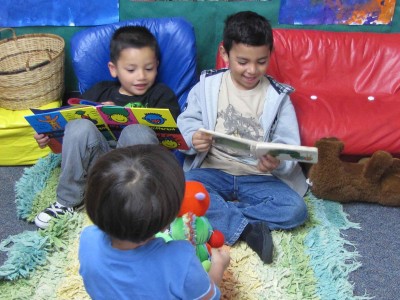—UPDATED—
The announcement of nine winners in the Obama administration’s latest version of its “Race to the Top” education competition will push forward reforms that early learning advocates have lobbied heavily for over the past several years.
The winners of the “Early Learning Challenge,” as the grant competition was called, are California, Delaware, Maryland, Massachusetts, Minnesota, North Carolina, Ohio, Rhode Island and Washington state. To win, they promised to increase accountability, raise the quality of preschool teachers and improve coordination between the various private and public agencies that provide early education.
“We are so incredibly excited,” Deborah Gist, the Rhode Island education commissioner, said during a conference at the White House this morning. “This acknowledgement by the administration to the importance of early education is encouraging.”
The announcement foiled predictions: The New America Foundation guessed only three of the eventual nine winners, based on how states have done so far in terms of coordinating and improving their preschool systems. Instead of Pennsylvania, which has been recognized as an early education leader, “the winners included North Carolina, a state suffering big cuts in early childhood funding this year,” Lisa Guernsey, director of the organization’s early childhood initiative, wrote in a blog post.
In a call with reporters, Obama administrations officials said some winning states were “well on their way,” while others are just beginning to develop their early learning systems.
“Many states we would have loved to have funded, but we didn’t have enough resources,” said U.S. Education Secretary Arne Duncan. “We took them in rank order.”
There was some overlap between this round of the competition, which was funded with money from the 2009 economic stimulus act, and the first Race to the Top grant competition, which called for reforms in K-12 education. Delaware, Maryland, Massachusetts, North Carolina, Ohio and Rhode Island also won in the earlier “race,” which had two rounds and a total of 12 winners.
California, which has not been as enthusiastic about embracing the K-12 reforms favored by the Obama administration, has been more active in pushing early learning reforms. It has increased spending on preschool access in recent years, and the state is launching a quality rating scale for preschools based on a program run by Los Angeles Universal Preschool. But Jon Schnur, co-founder of the advocacy group New Leaders for New Schools and current chairman of America Achieves, said that he was “personally surprised to see California as a winner.”
The state of Washington has also been lauded for its work linking preschool with older grades to prevent learning loss as children move from preschool to the elementary grades. (Seven of the winners included plans to improve alignment between preschool and the early grades in their applications.)
Some advocates were excited about the results, saying it was a watershed moment that would bring together what has been a scattered field.
“It’s been the most exciting time in the past four decades for young children in our country,” said Sharon Lynn Kagan, co-director of the National Center for Children and Families at Teachers College, Columbia University, in a call with reporters hosted by the Education Writers Association. “It has both symbolic and substantive value … It says to America that early learning matters.”
There’s less money to go around this time: $500 million, compared to about $4 billion for the K-12 grants. But the requirements are not as controversial as the requirements for K-12 schools. In the earlier competition, many states set out to create systems that evaluate teachers using test-scores and to open more privately-run public charter schools—reforms that have met with opposition from teachers unions and others.
In the early learning competition, states were encouraged to create kindergarten readiness tests, however, which has raised concerns about standardized testing of young children. But Dana Goldstein, an education writer and fellow at the New America Foundation, has written that “the model the administration has in mind for pre-school assessment is low-stakes for individual teachers and students and measures not only academic performance but also children’s social, emotional, physical and artistic readiness for kindergarten.”
“This is partly about academic outcomes, but it’s partly about other outcomes … that make a difference” like self-control, persistence and social skills, said Schnur. Kagan said that while there have been concerns about an increasing of testing that could be “injurious to young children,” she was “very enthusiastic” about the sorts of tests being planned by the winning states.
For a breakdown of what the winning states will likely be doing, see this post at the New America Foundation’s Early Ed Watch. For individual state applications, see here.




